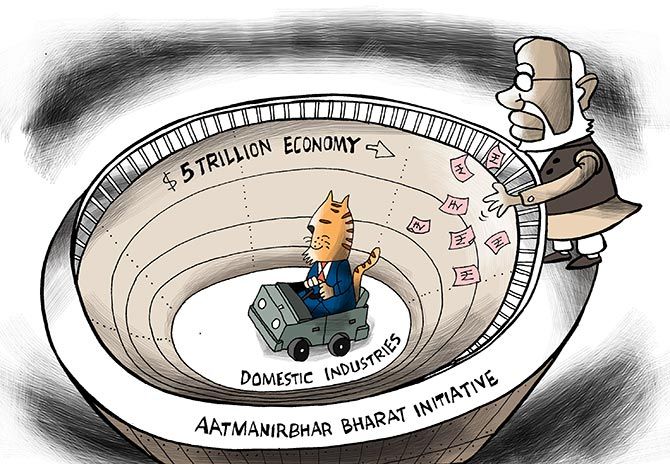'The first year of the Modi government's second term has laid the roadmap for the future and we will embark on it with gusto,' promises Gopal Krishna Agrawal, the BJP's national spokesperson on economic affairs.
Illustration: Uttam Ghosh/Rediff.com

The Narendra Modi government has completed the first year of its second term.
The 2019 mandate was historic.
It is a source of confidence, but also throws up challenges.
In the first five years, the focus was on structural changes, creating a transparent business ecosystem and a level playing field.
Mr Modi made transformative changes in the ecosystem, taking challenges head on.
The first year of the second term was no different.
The government has been using technology to build State capacity.
It identifies the problem, creating technical solutions, integrating stakeholders into the ecosystem and creating a performance matrix for evaluation.
The COVID-19 crisis has brought into sharp focus the aspect of State capacity.
Use of Big Data and Artificial Intelligence for good governance, policies and welfare programmes is bringing massive improvement in State capacity.
India's earlier digital foray based on Aadhaar is very different from that of other countries, and has set an example for the world.
Indian talent in these areas is being nurtured and leveraged.
It was a year when ideology took precedence over other things.
Home Minister Amit Shah rightly said that the BJP had not been re-elected to merely govern, but to address India's long-standing issues.
The country was bogged down by certain historical problems.
Article 370, which our founding fathers had envisioned as a temporary measure, had become permanent.
We asserted that Jammu and Kashmir was an integral part of India, but on the ground it seemed otherwise.
The wavering leadership of earlier times had neither the courage nor the vision to unshackle historical wrongs.
The Modi government removed it in one go.
Enacting the Citizenship Amendment Act, dealing with Rohingya infiltrators or the National Population Register and the National Citizenship Register indicate that India's national interest is supreme.
The second Budget was a landmark in laying down a road map for a $5 trillion economy.
The government provided for all the important sectors, such as technological textiles, power and renewable energy, and connectivity (airports, seaports and railways).
The Budget focused on wealth creation, pro-business policies and minimal government intervention.
It desisted from increasing direct or indirect taxes for resource generation.
Announcement of a Taxpayer's Charter is an important step in bringing accountability in the tax administration.
Provision for a statutory taxpayer's charter exists only in three other countries worldwide.
The reduction in corporate tax to 25 per cent, continuous decriminalisation of the Companies Act 2013, protection of domestic industries by not joining the Regional Comprehensive Economic Partnership against all pressure, renegotiating free trade agreements with Asean (Association of Southeast Asian Nations) countries, and increasing import duties in eight segments were all to protect industries from the onslaught of unfair global competition.
COVID-19 is a nonlinear and uncertain event.
The government's interventions are commensurate with the severity of the global recession.
Demand in the economy is diminishing due to economic uncertainty, job losses and financial problems.
Therefore, the government's focus is on reviving demand.
The growth potential in primary activities like agriculture and the rural economy can revive the broader economy.
The deglobalisation trend, which started after the global financial crisis and gained strength after the 2016 US elections, is expected to accelerate.
India is also focusing on being self-reliant in critical products and areas.
The Aatmanirbhar Bharat initiative, focusing on reforms in all the factors of production, will make our domestic industries competitive, rebuilding and catalysing growth in an unprecedented manner.
There are challenges for the manufacturing sector, such as lowering the interest rate, reducing logistical costs, labour reforms, ease of compliances, contract enforcement and foreign direct investment policy.
But, meeting them with collective resolve will yield a V-shaped recovery for India.
The government's efforts in areas such as the Insolvency and Bankruptcy Code have resulted in reducing the risk premium on interest cost, and successive reductions in the repo rate and the reverse repo rate have brought down the prime lending rate.
These will help in private capital formation.
The logistics sector's contribution to gross domestic product is currently 14 to 15 per cent in India, whereas in developed countries it is 9-10 per cent, meaning that transportation costs for our manufacturing sector are about 40 per cent higher.
The government has announced a National Logistics Policy, aiming to bring them down by 2022.
Easing compliance requires technological innovations.
The government has announced e-assessment for income tax.
Most compliances required by the Reserve Bank of India, Registrar of Companies and the Securities and Exchange Board of India have been computerised.
Indirect tax payments can be made online through the Goods and Services Tax Network.
The government had set up a robust startup ecosystem comprising the Atal Innovation Mission, Atal Incubation Centres and Tinkering Labs.
Emerging areas like AI and data analytics have massive scope in India.
The five pillars of Aatmanirbhar Bharat -- economy, infrastructure, technology, demography and demand -- will create greater opportunities in future.
Demand is being revived through infrastructure spending and a direct stimulus through the Pradhan Mantri Garib Kalyan Yojna, but since the Rs 20-trillion economic package has a large debt portion, further direct infusion of liquidity will have to be looked at by the government.
The first year of the Modi government's second term has laid the roadmap for the future and we will embark on it with gusto.
Production: Aslam Hunani/Rediff.com












 © 2025
© 2025